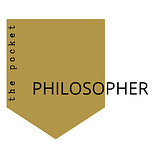Good morning fellow Philosophers,
I hope you enjoyed yesterday and are ready to peel back another layer on knowledge and our ability to perceive the universe. (Also grateful that you returned after a day of challenging even our most basic grasp on reality!)
Today we’re going to move forward a few thousand years from Theseus and his ship to France in the 1600s. There we find Rene Descartes who at the ripe old age of 23 began breaking down barriers in the larger philosophical conversation with a much needed evolution in thought, science, and epistemology.
Every morning I write an email exploring life through the eyes of the world’s greatest thinkers. Sign up here if you would like to receive it directly in your inbox.
A quick note on epistemology that we didn’t get to cover yesterday. While Theseus is one of my favorite ways to apply an understanding of this art, I do want to take one more pass across its more literal definition.
The word wouldn’t be formally introduced into the modern english language for a few hundred years after Descartes, and was built upon two Greek words meaning science or knowledge, and another meaning discourse. At its heart, epistemology is about logically arguing past our perceptions into what is truly happening (that classic tension between what we perceive and what is factual).
I like this topic so much because to study epistemology is a courageous act taken by people with strong minds and open hearts. Also, this study produces organized, systemic ways to combat our biases. Deciding to confront and logically dissect the way we perceive the world while remaining open to the way reality might present itself to us is an incredibly difficult skill to cultivate.
I would call this intentional open-mindedness epistemic humility (an experienced-based recognition that my perception of the world is inadequate and that I will always be learning), which leads one to cultivate charity in their learning, discourse, and public debate.
What I mean by this, is that deciding to recognize your own limitations of perception leads one to hold space for even the most seemingly outrageous hypotheses. In this way, people who are epistemically humble and practice charity are willing to listen to any evidence-based logically presented argument with an open mind.
I envision this type of worldview and practice laid against the often short-tempered, ill-informed, and self-confident clashes that exist between many people in the modern world. Often armed with little more that a soundbite, social-media post, or video clip many people are prepared to defend a new (bias-confirming) idea all the way to violence.
This makes me think of the philosopher Sir Bertrand Russel, who answered a journalist’s question, “would you ever die for your beliefs” with,
Of course not, I might be wrong.
It’s only those who have cultivated the disciplines of epistemic humility and charity and have formed such intimate awareness of their own limited abilities to perceive, that value hearing every argument in its fullest logical conclusion.
And it was in this tension, again, at the incredibly young age of 23 that Rene Descartes sensed we could take our logical arguments beyond metaphysical thought experiments, and in to the world of objective verifiable experimentation.
While on campaign in the French army Descartes met a Dutchman who was beginning to leverage mathematics to explain his experiments in physics. Building on this man’s rudimentary ideas, Descartes was so inspired that he had a dream, and began unravelling his intuition in the objective, verifiable language of mathematics.
Specifically, this initial flash of insight leads Descartes to develop analytical geometry, seeing the relationship between algebraic math and shapes in the physical world. (So if you hated your junior year of high school you now know who to blame!)
His work, however, takes years to be released into the larger public discourse because of the Catholic Church’s aggressive silencing of science. In seeing Galileo’s books burned, Descartes decided to hold back for years until it was safe for him to enter public dialogue.
What is most important in my opinion about Descartes is his concept of method. Largely, he believed that our collective human knowledge and consciousness had plateaued because we were stuck in metaphysical thought experiments. He perceived math and science as a vehicle to take our knowledge from mental perception and hypothesis, through discourse, and into verifiable experimentation and mathematical equations.
He perceived the world of observation ordered like a tree with roots, a trunk, and branches, moving from fundamental to experimental.
Thus the whole of philosophy is like a tree; the roots are metaphysics, the trunk is physics, and the branches that issue from the trunk are all other sciences.
This view would drive so much scientific and mathematical thought for years to come. You can already see a clear line right into the scientific method now all learn in junior high science class.
So we’ll conclude on this idea today, that in his willingness to recognize his current limitations of perception, Descartes was inspired to reconcile and meld the worlds of mathematics and sciences in a way that would fundamentally change all future thought. This epistemology was not based in thought, but rather rooted in hypothesis and dialogue, and ultimately lent itself to objective scientific proof.
This process is how we know what we know today—it is our epistemology.
So the next logical question is, what’s next?
Until tomorrow,
-TPP
References:
The Great Conversation, Norman Melchert
https://plato.stanford.edu/entries/epistemology/
https://en.wiktionary.org/wiki/epistemology
https://quoteinvestigator.com/2016/03/07/never-die/
Image:
https://en.wikipedia.org/wiki/Ren%C3%A9_Descartes















Share this post